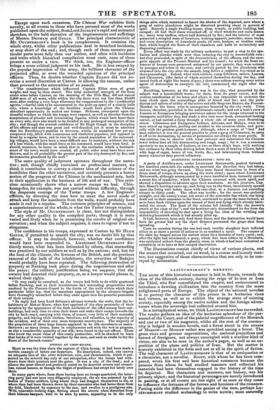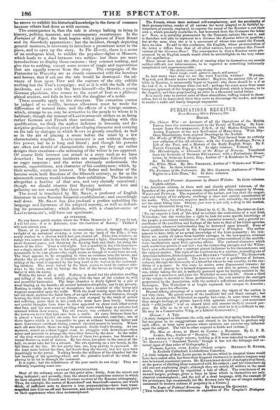LA.11TCHNIKOFF'S HERETIC.
THE scene of this historical romance is laid in Russia, towards the close of the fifteenth century, during the reign of Io-ann or Ivan the Third, who first consolidated the empire, and endeavoured to introduce a dawning civilization into the country from the more enlightened parts of Europe. The object of the national novelist is to portray the character of this prince in its barbarian vices and virtues, as well as to exhibit the strange state of existing society, especially among the native nobles and the foreign adven- turers whom the sovereign had collected around him. In a metaphysical sense, we think LAJLTCHNIKOFF has succeeded. The reader gathers an idea of the barbarian splendour of the per- sonnel of the Court, and of the palatial magnificence of the Monarch and one or two of his magnates, whilst all the rest of the commu- nity is lodged in wooden hovels, and a forest stood in the streets of Moscow—or Moscow rather was sprinkled among a forest. The gross vices and grosser superstitions, the national prejudices and hatred of foreigners, not always unmingled with a sturdier kind of virtue, are also to be seen in the author's pages, as well as an ex- position of the plans and politics of Ivan. But the matter is scarcely exhibited in the form and not at all in the spirit of fiction. The real character of LAJETCEINIHOFF is that of an antiquarian or a chronicler, not a novelist. SCOTT, with whom he has been com- pared, wrote his first and best historical romances because the persons from whom he had studied manners and collected his materials had been themselves engaged in the history of the time he depicted. But characters and manners, not history, was his primary object ; and the historical personages are merely introduced in passing, or at all events are lost sight of as soon as they cease to influence the fortunes of the heroes and heroines of the romance. Putting aside the difference in the genius of the men, perhaps La- ATCHNISOFF studied archeology to write novels; most assuredly he Strove to exhibit his historical knowledge in the form of romance because others had done so with success.
The consequence is, that the tale is always halting to bring in history, politics, manners, and contemporary occurrences. In the Fortunes of Nigel, the book begins with a picture of Fleet Street and its disorderly apprentices ; but the incident, though depicting general manners, is necessary to introduce a prominent actor in the piece, and to open up the story. In The Heretic, there is a scene of an analogous kind, to exhibit the populace-fights at Moscow, which leads to a duel between two nobles : but these are mere introductions to display those customs ; they connect nothing, and give rise to nothing, except some scenes of magic and superstition that are equally remote from the story. The campaigns of the Pretender in Waverley are so closely connected with the heroines and heroes, that if cut out the tale would be destroyed : the ad- vance of Ivan upon Tver and the capture of the city exhibit nothing but the Tsar's campaign ; and so it is with the bulk of the incidents, and even with the hero himself—the Heretic, a young German physician, who comes to the court of Ivan as a philoso- phical student, and falls in love with the daughter of a noble.
These remarks apply to the structure. The execution cannot be judged of so readily, because allowance must be made for differences of natural taste, and the effects of a foreign manner, which, strange to us, may be attractive to the people to whom it is habitual ; though the manner of Ls.rg.reuraKorr strikes us as being rather German and French than national. Speaking with this qualification, we think the author deficient in dramatic and de- scriptive genius—in that power of developing character and carrying on his tale by dialogue in which SCOTT so greatly excelled, as well as in the art of placing a scene before the mind by a few characteristic touches. LAJETCHNIKOFF is not without descrip- tive power, but he is long and literal ; and though his persons are often not devoid of characteristic traits, yet they are rather designs than creations—the scheming of the writer is too apparent. Of course little interest can attach to a story such as we have described ; but separate incidents are sometimes followed with an eager suspense ; and the writer obviously understands the morals, superstitions, and character of his countrymen ; which, by
• their novelty, create an interest. The father and brother of the
heroine seem both Russians of the fifteenth century, so far as the nineteenth century would tolerate their exhibition. The heroine is altogether a heroine of that rem' and very cleverly conceived ; though we should observe that Russian notions of love and gallantry are not exactly like those of England. The novel is translated by Mr. SHAW, a professor of English literature in some Russian Imperial establishment ; and exceedingly well done. Mr. SHAW has also prefixed a preface upholding the language and literature of his adopted country, as well as defend- ing its pronunciation • which defence, with a chamber-scene of LAJETCHNIKOFF'S, will form our specimens.
AN INTERIOR.
Do you know, gentle reader, where the White Mountain is? If you do not, I will tell you : it is in Bohemia, near the frontiers of Saxony. Thither I will now convey you. There, at no great distance from the mountain, loomed, through the grey twilight of an autumnal evening, a tower on the bank of the Elbe : it was .• newly washed in a shower which had just cleared off. From two windows, or rather two narrow slits in the thick wall, glimmered a light, illuminating their small diamond panes, and throwing its dancing flash and shade far along the bosom of the river. 'Twas a wild night. Not a sparklet in the wide heavens— not a single streak of white to harbinger the dawn. The darkness looks im- measurable in its vast gloom—the night seems as though it would have no end. The blast appears to be struggling to force an entrance into the tower, and shrieks like an evil spirit as it wrestles with its time-worn battlements. The yelling of the wind is repeated by the long howl of the wolves in the surround- ing thickets. The river, lashed by the blast, seems to bend its current side- ways to the bank, and to besiege the foot of the tower, as though eager to batter it with its waves.
Within the tower all is still. Nothing is heard but the plaintive swelling
and falling of the wind, fitfully playing with the bars of the window its wild and mournful harmonies. The large chamber is dimly lighted by a pile of wood blazing on the hearth; all around indicates simplicity, not to say poverty. Nothing is visible in the way of decorations but a number of elks' horns and weapons suspended upon the walls. With the head resting upon the back of a tall old chair, reclines the faded form of an aged woman, whose features, though bearing the livid traces of severe illness, and stamped by the track of sorrow and suffering, prove that in her youth she must have been lovely. Gloomy and painful thoughts from time to time appeared to chase each other across that face, and her soul seemed swelling with tears which hope or patience had retained within their source. The old woman was evidently the mistress of the tower—a tower that had once been a castle. At some distance from her is placed a hoary-headed old man, her retainer, seneschal, castellan; one of those figures which it is impossible to gaze at without becoming better and more benevolent—without feeling yourself elevated nearer to heaven. Where such old men dwell, there, we may be assured, dwells God's blessing. At one moment, seated on a three-legged stool, he struggles with drowsiness—then arises and proceeds to arrange the fire—then listens by the door. In the midst of the deep winter embodied in the faces of these two persons, has bloomed a vernal flower—a maid of sixteen. By her dress, her place in the recess of the hall, we must take her for a servant. She sits spinning on a low bench, in the full blaze of the fire. On her pretty face, too, deep anxiety is expressed. At the least noise behind the door, her hands drop the thread, and her eyes turn inquiringly to the portal. Nothing breaks the stillness of the chamber but the low buzzing of the spinning-wheel, and the plaintive howl of the wind, im- ploring to be let in through the casement. It is night ; but the inhabitants of the poor castle do not sleep! They are evidently expecting some one.
RUSSIAN PRONUNCIATION.
Most of the ordinary errors on this point arise, firstly, from the accent not being indicated; and secondly, from the absurd and capricious manner in which we have adopted the French and German versions of the Russian orthography. Thus, for example, the names of Koutafisoff and Souveroff—names, one would 'think, of sufficient note to deserve a true pronunciation—have been trans- %anagzifistd into Cut-us-off and Suwarrow, and subjected to divers unseemly jests on thew appearance when thus metamorphosed. The French, whom their national self-complacency, and the pecaliarity of their pronunciation, render of all natioas the worst adapted tote faithful in- terpreters of sounds, employed, to express the sound of the Russian v, not their own v, which precisely resembles it, but borrowed from the Germans the letter ! Now, w is certainly pronounced by the Teutonic nations like our v, and is therefore well able to represent to a German the Russian letter in question; but at the same time the w is a consonant of whose true sound the French have no idea. To add to this confusion, the English, whose pronunciation of the letter w differs from that of all other nations, have retained this French version of the German-Russ The consequence is, that a Russian name pro- nounced by an English mouth would often be unintelligible to the very owner of the appellation. These errors have had the effect of causing what iq themselves are sounds neither difficult nor inharmonious, to be regarded as something ludicrously complicated and unpronounceable :
" The skilful critic justly blames
Hard, tough, crank. gutturol, harsh, stiff names." In how many ways may we see the word VoevAda written ? Woiwode, Waywod, and Heaven knows what besides ! Boyarin, the ancient title of no- bility in Russian, is occasionally boyar or boyard: why there should be a if at the end of it, a Frenchman alone can tell ; perhaps the error arose from some foreigner, ignorant of the language, supposing the plural, which is boyare, to be the singular, and thus perpetuating an error in a thousand varied forms. It is surely time to correct some of these absurdities, trifling indeed in them- selves but to be deprecated when they serve to discourage the reader, and tend to render a noble and manly language unpopular.



























 Previous page
Previous page